Earlier this month, researchers discovered that a free-to-play game called Piratefi is spreading the Vidar Information Steel Malware to users at the game platform Steam. From 6-12 February, as many as 1,500 users downloaded the game before Steam removed it from the platform.
The situation must be a wake -up call for all players.
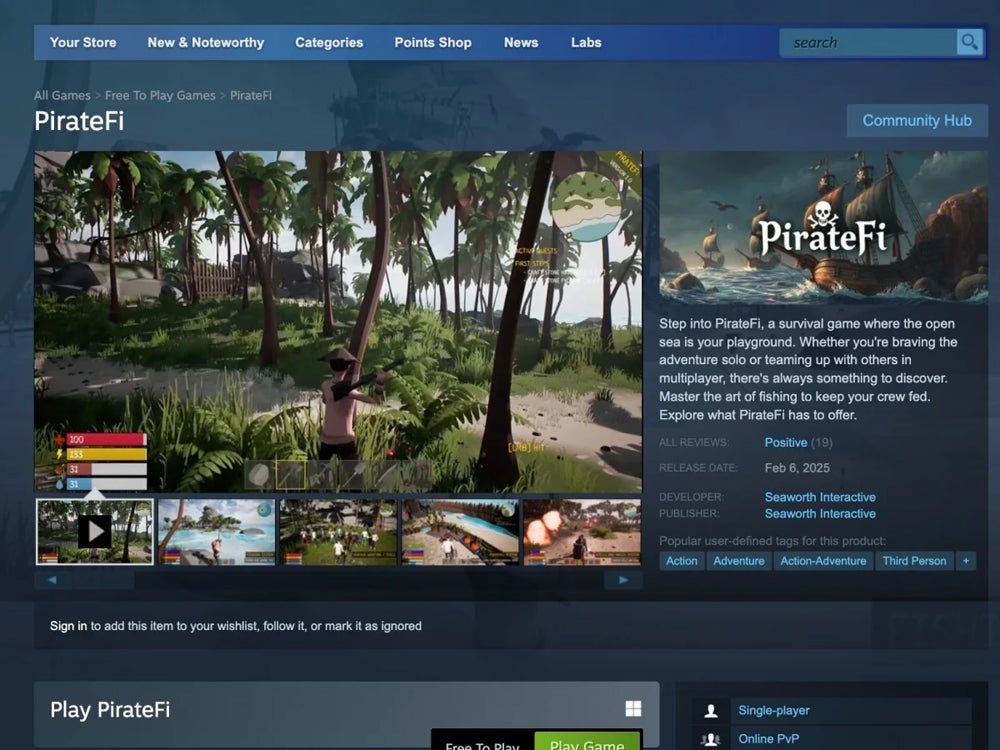
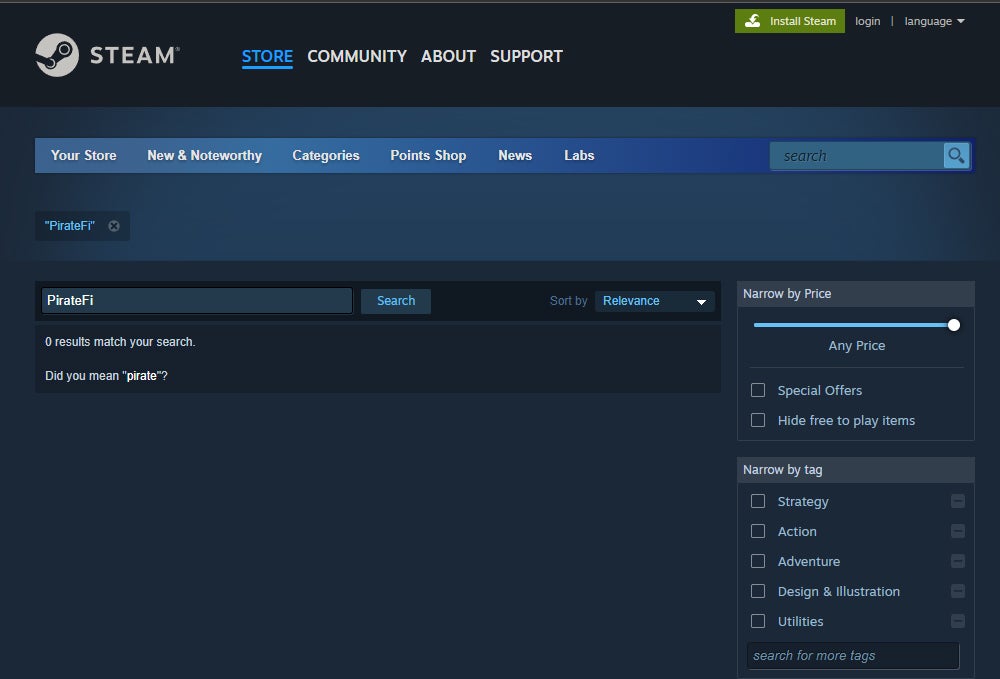
What is Piratefi?
Piratefi is an exciting survival game that collects food and supplies, manufacturing tools and weapons and builds bases. The game can be played in single and multiplayer modes. It received a 9/10 rating and several glowing reviews.
While ratings and comments can be made to increase involvement, Piratefi seemed to be on his way to become a big hit among gamers, as several people dropped off the game in the short time it was on Steam’s market.
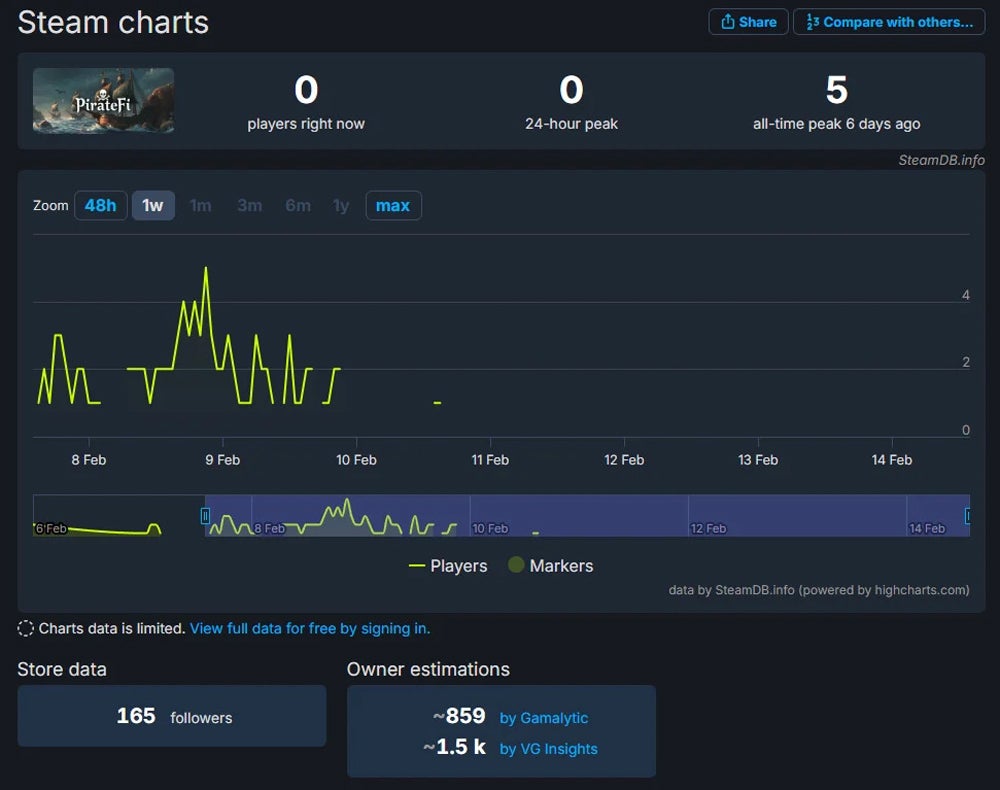
However, gamers were about to find out that Piratefi was not the only thing they had downloaded. Users started receiving messages on Telegram about an in-game chat modernator who paid $ 17 per hour. The idea of being paid to play and communicates in the game – something they probably would have done for free – sounded too good to be true. One user especially found it to be suspicious and did dig.
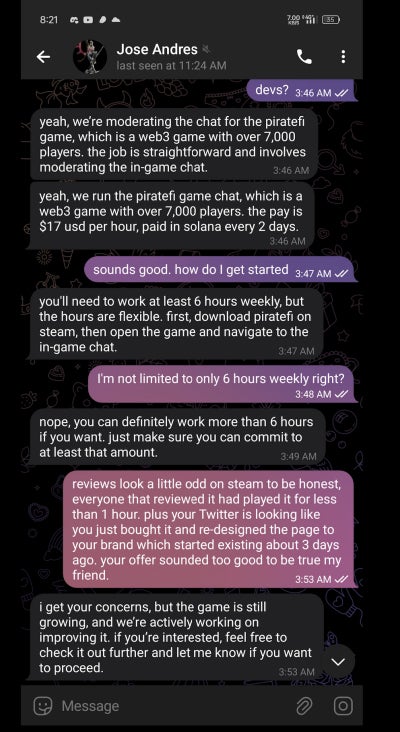
First, he noticed the cadence of the messages. He saw that the answers of the ‘developer’ were sent exactly 21 seconds to the previous message. If you do not pay attention, you will probably miss the detail. Messages that are all evenly spaced are clear indications of a false and automatic account – and you probably talk to a chatbot.
And that’s exactly what’s going on: The chat moderator track did not exist.
The AI chatbot offered gamers the role of letting them down and installing the game. So why lie about a job? Was it a malicious marketing problem to increase their download numbers and popularity on Steam? Or was it something more sinistic like social engineering or a phishing attack to steal user information or worse?
A dangerous game
While users were starting to catch that something ‘fish’ was about the chat modernist work, another user found out that it wasn’t the job that was the problem. That was the game itself.
This message on the Steam Games forum we translated with Google shows that a user is trying to install the game, but his antivirus software did not download it because it contains a file known as’ Trojan .win32.lazzy.gen. ‘
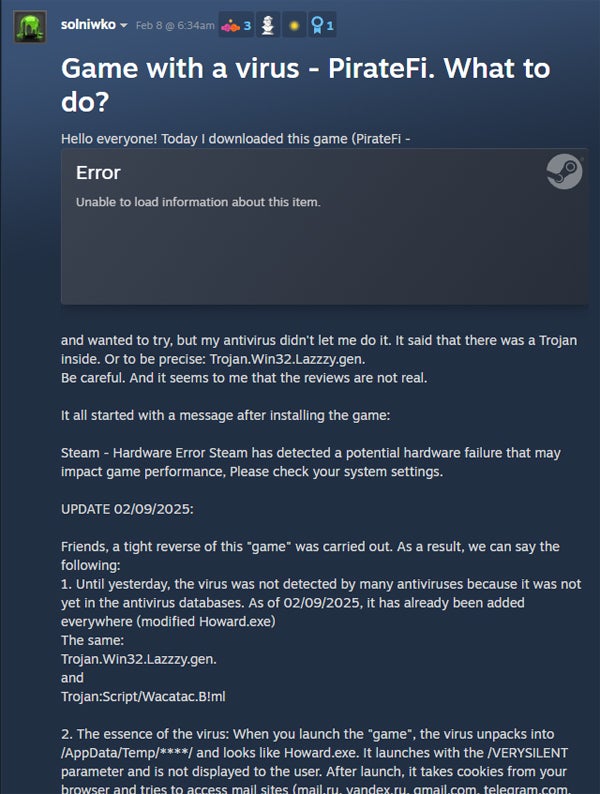
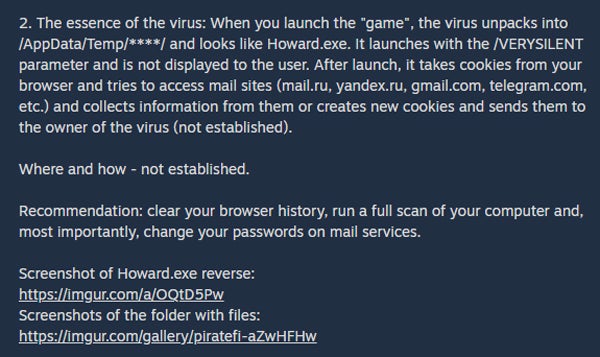
After a little review, it appeared that the ‘game’ contained other software that was installed and launched once Piratefi. A file called Howard.exe will be added to the user/app data/temp/****/directory with a parameter called/very silent.
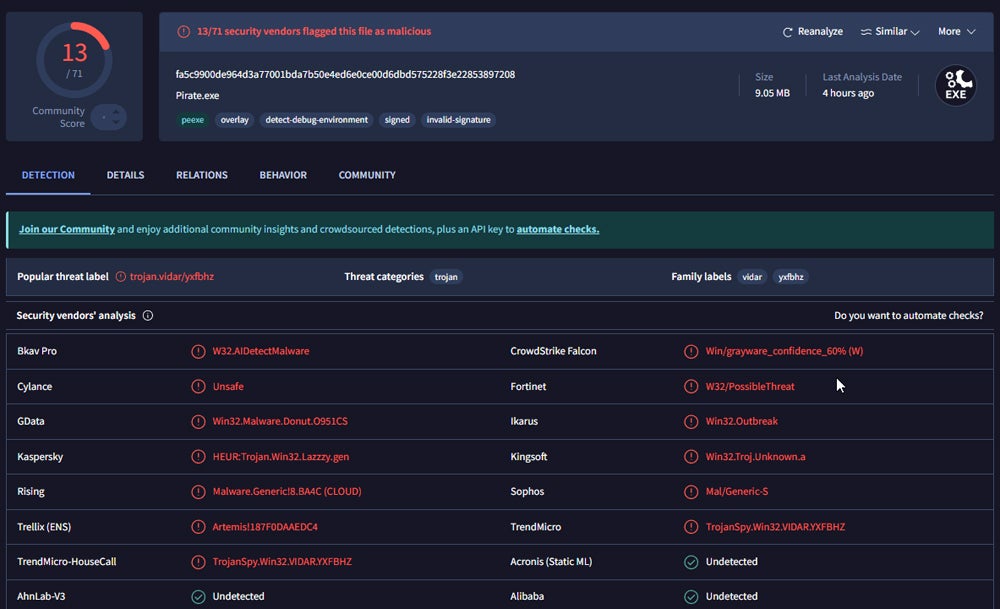
This means that the action would take place in the background, and that the status would not be displayed. It seems that Piratefi has spread malware. So what exactly is malware?
What is malware?
Walware is any kind of software designed to harm your computer or steal your information. Think of it like a digital virus. It can do all kinds of nasty things – from the delayed computer, to stealing your passwords and even giving hackers control over your entire system.
In the case of ‘Piratefi’, the malware is designed to steal passwords. After checking the malware, Secuinfra identified the malware as a version of the Vidar Infostealer and posted this message on social media:
‘If you are one of the players who have downloaded this’ game’: Consider the credentials, session cookies and secrets in your browser, e -mail customer, cryptocurrency wallets, etc.
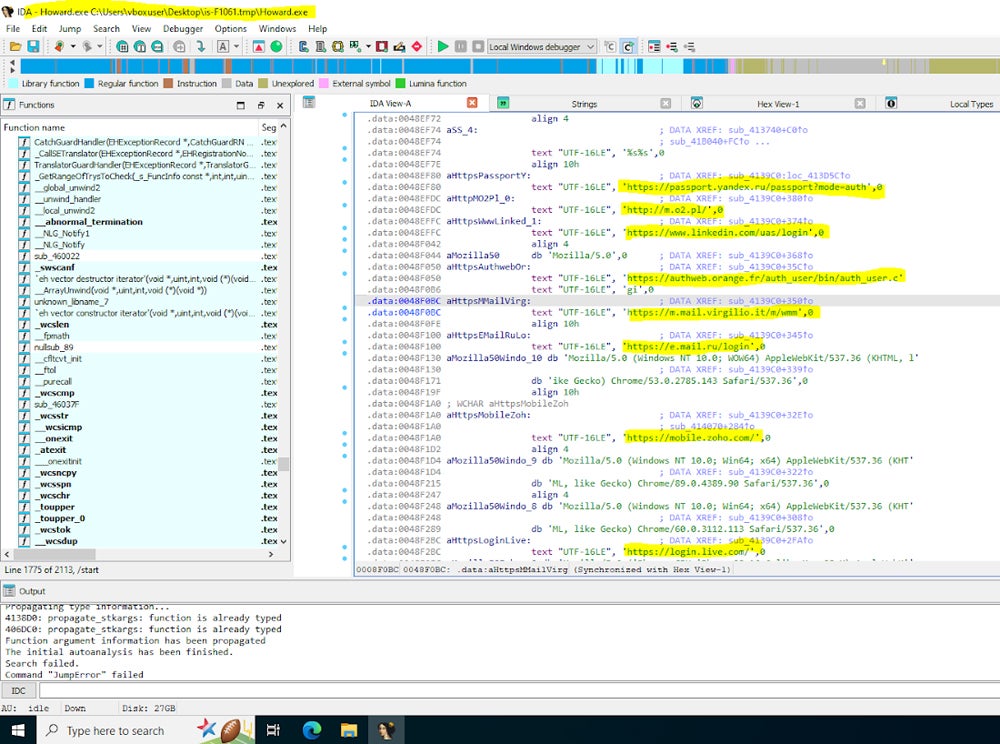
If you have played the game, the login details for UE post, social media, banking or any other online account you report can be jeopardized. Imagine the damage someone can do with the information.
For more information on malware and the different types, Look at this article.
What to do if you have piratefi installed
This incident highlights several critical points: First, regular social engineering techniques succeed more than failed. However, with AI, the chances of attackers who succeed in their attacks increase significantly. As a result, users need to be more aware of online spending and phishing attacks.
Just because something is on a platform like Steam does not automatically mean that it is safe or trusted. Unfortunately, bad actors can sometimes find ways to sneak malicious software in even seemingly reliable places.
Several affected users have placed warnings on Piratefi’s Steam Community page and said everyone should stay away from the game because it contains malware. In addition, Steam posted a message confirming that the game contained malware and encouraged users to do a complete system scan.
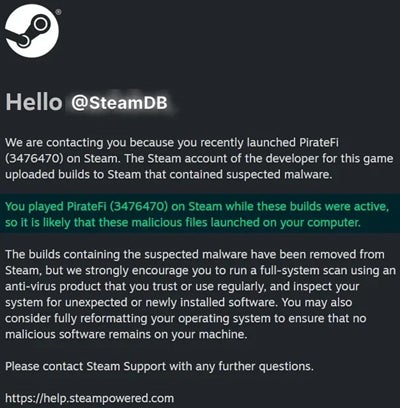
If you have downloaded ‘Piratefi’ is what you need to do immediately:
- Remove the game: Get it off your system immediately.
- Start a complete system scan with your antivirus software: This will help detect and remove any remaining malware. If you do not have antivirus software, get it now! This is essential.
- Change your passwords: Change the passwords for all your important online accounts, especially email, banking and social media. Use strong, unique passwords for each account.
- Monitor your accounts: Watch your online accounts closely for suspicious activities. Look for unauthorized sign -in, strange email or anything else extraordinary.
Tips to stay safe
In addition to what you need to do to protect yourself immediately, this is how you can protect yourself in the future:
- Be careful with free software: Free does not always mean good. Note any free software, especially from unknown developers. Do your research before installing anything.
- Keep your software informed: Install updates and patches on your operating system, web browser and antivirus software. Updates often contain important security arrangements.
- Use strong passwords: Use unique and strong passwords for each account. A password manager can help with this.
- Do not click on suspicious links: Be careful of links and QR codes in email, messages or websites.
- Stay informed: Stay up to date with the latest news and threats in cyber security.
Verify the legitimacy of games
The ‘Piratefi’ situation is a reminder that malicious actors are always looking for data – even in the spaces you would least suspect – and that online security is everyone’s responsibility. You must always verify the legality of a game before downloading and installing it.
To verify new or lesser -known games on platforms such as Steam or Epic:
- Investigate the developer.
- Evaluate the presentation of the game.
- Checking the feedback from the community.
- Watch out for red flags such as inconsistent information or unrealistic promises.
- Trust your instincts.
Taking these precautions can significantly reduce you at risk of reducing the victim of malware, enjoying your favorite activities, such as playing video games.
(Tagstotranslate) Hacking Game (T) Piratefi (T) Steam (T) Steam Hacking News (T) Steam Malware (T) Steam Remoted Games (T) Steam Security Breach (T) Video Infostealer
+++++++++++++++++++
TechNewsUpdates
beewire.org










